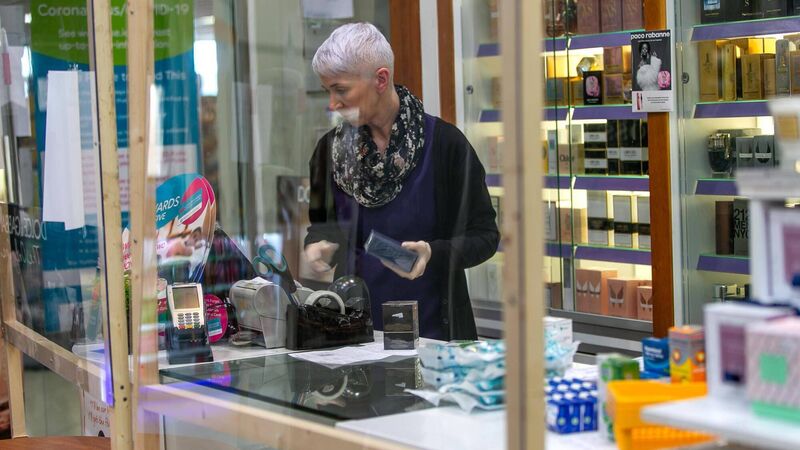Brian Keegan: The public gets what the public wants

Staff working behind perspex screens of a Galway pharmacy. 'In the space of a few months, we have re-engineered how our public services are delivered, how we shop, how we educate and assess student achievement.' Picture: Andy Newman
When people’s confidence is shaken, it can be shown in different and sometimes unpredictable ways.
The Irish response to Golfgate was in part triggered by different rules seeming to apply for an elite than for the rest of society. However, the outrage also reflects a significant element of frustration because the desire of people generally to control coronavirus was being thwarted by the actions of people who should have known better. It seems the reaction may not have been just about the individuals involved.
The acknowledgement from the President of the European Commission, Ursula von der Leyen, of Phil Hogan's resignation took only two minutes to deliver. She used a lot of her time in those two minutes to acknowledge the efforts of citizens right across the EU in dealing with coronavirus rather than to mark the resignation.
The political awareness of people’s anxiety to deal with the pandemic shown by von der Leyen needs to be marshalled and controlled if we are to recover quickly from the economic downturn. One of the nastier side effects of coronavirus is its capacity to infect our society, its businesses and its establishments with distrust. Some of our institutions have had to undergo fundamental change, and confidence cannot be built through making comparisons with what has gone before.
Confidence in our education system and its ability to deliver a new method of coherent grading so that students can access third level education seems to be plummeting. It is as if we expect our teachers and the Department of Education to fail. This expectation is groundless because there is no previous Irish experience against which to measure it. The negative experience of comparable processes in the UK is a warning. It is not a precedent.
All over the country, in every walk of life, totems have been knocked down. In the space of a few months, we have re-engineered how our public services are delivered, how we shop, how we educate and assess student achievement. Many businesses have re-imagined their business model and are now trading online more than ever and with people working from home. We are in the new normal and it is not going to change anytime soon.
This is why the slow, hesitant recovery in consumer sentiment, as measured by KBC Bank and the ESRI, is a pointer to some of the actions needed for business recovery. People are more reluctant to shop, travel or purchase services where they are not comfortable that the business has taken appropriate measures to safeguard them from the virus. Marketing gurus talk about the “USP” or the unique selling proposition which businesses need to be able to demonstrate if they are to thrive.
Last year’s USPs involved things like quality, value, customer service and convenience. The USP for successful businesses operating in the new normal is health security.
There are signs that business conditions are slowly improving. A critical indicator is employment. In recent weeks fewer jobs are reported as being subsidised under the government’s wage subsidy scheme, and the number of people receiving pandemic unemployment payments is down by almost two thirds from the peak in early May. These positive trends will falter if consumer confidence does not grow.
Golfgate has as strong a message for businesses as it has for politicians. In the months ahead, the public’s fear of the virus is going to drive commercial behaviour just as much as it drives political reaction.
- Dr Brian Keegan is Director of Public Policy at Chartered Accountants Ireland



